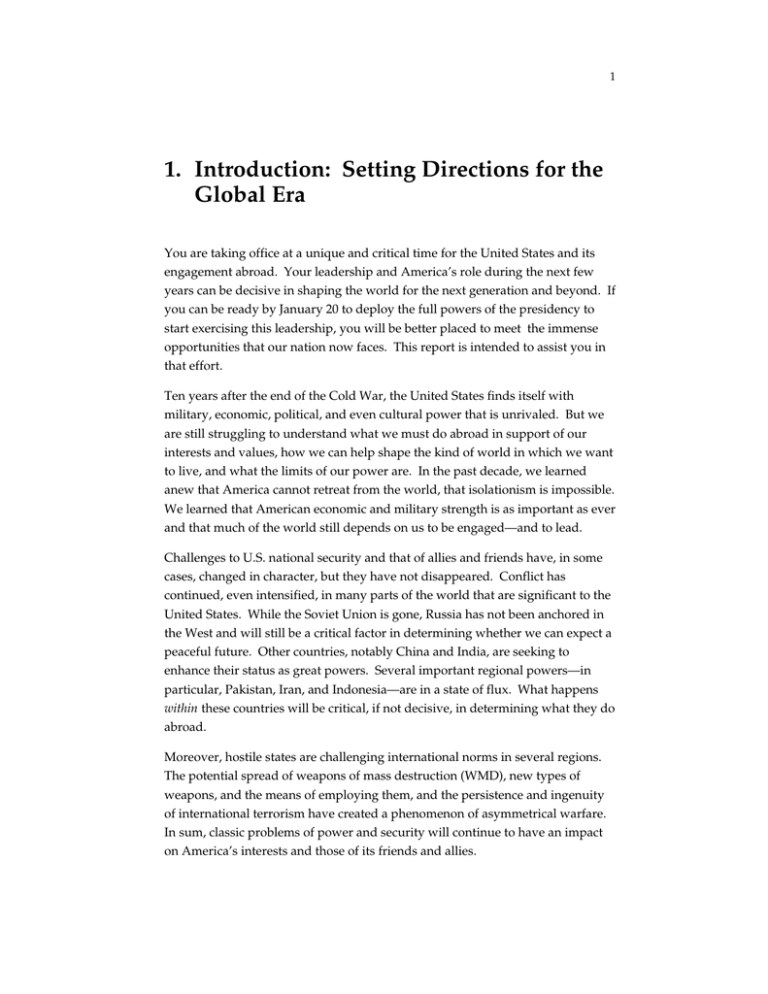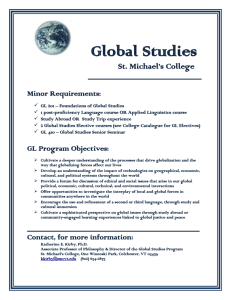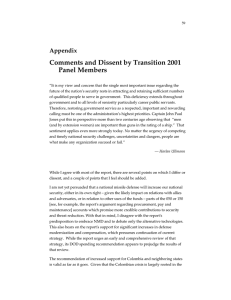1. Introduction: Setting Directions for the Global Era
advertisement

1 1. Introduction: Setting Directions for the Global Era You are taking office at a unique and critical time for the United States and its engagement abroad. Your leadership and America’s role during the next few years can be decisive in shaping the world for the next generation and beyond. If you can be ready by January 20 to deploy the full powers of the presidency to start exercising this leadership, you will be better placed to meet the immense opportunities that our nation now faces. This report is intended to assist you in that effort. Ten years after the end of the Cold War, the United States finds itself with military, economic, political, and even cultural power that is unrivaled. But we are still struggling to understand what we must do abroad in support of our interests and values, how we can help shape the kind of world in which we want to live, and what the limits of our power are. In the past decade, we learned anew that America cannot retreat from the world, that isolationism is impossible. We learned that American economic and military strength is as important as ever and that much of the world still depends on us to be engaged—and to lead. Challenges to U.S. national security and that of allies and friends have, in some cases, changed in character, but they have not disappeared. Conflict has continued, even intensified, in many parts of the world that are significant to the United States. While the Soviet Union is gone, Russia has not been anchored in the West and will still be a critical factor in determining whether we can expect a peaceful future. Other countries, notably China and India, are seeking to enhance their status as great powers. Several important regional powers—in particular, Pakistan, Iran, and Indonesia—are in a state of flux. What happens within these countries will be critical, if not decisive, in determining what they do abroad. Moreover, hostile states are challenging international norms in several regions. The potential spread of weapons of mass destruction (WMD), new types of weapons, and the means of employing them, and the persistence and ingenuity of international terrorism have created a phenomenon of asymmetrical warfare. In sum, classic problems of power and security will continue to have an impact on America’s interests and those of its friends and allies. 2 At the same time, as you assume the presidency, one of history’s more profound revolutions, unleashed largely by swift and radical advances in technology, is causing changes, both within societies and in the world as a whole, that may prove as profound as those that followed the Industrial Revolution two centuries ago, but whose precise character and impact can now be only partly understood. Globalization is transforming the nature of international life in finance and economics, and increasingly in politics and security; disparities of wealth are growing within many societies and, in some cases, between advanced and developing states. Certain social, political, and religious forces are having a growing impact. Governments are less in control of foreign policy than they were only a few years ago; global politics is increasingly being shaped by nongovernmental organizations (NGOs) and by private-sector and financial entities that transcend traditional state borders. For most countries, sovereignty is eroding—in some places, such as the European Union (EU), by design; elsewhere, as an unintended consequence of the digital age. Resentment of globalization is on the rise and has produced increased anti-Americanism, since Washington is perceived as its architect. Should this trend grow, it could hamper efforts at building new global trading and financial institutions that are necessary to expand and spread prosperity around the world. Newer concerns, including cross-border crime and illegal narcotics trafficking, threats in cyberspace, the challenge of mass migration, the rise of religious extremism, humanitarian disasters, failed states and warlordism, environmental degradation, and the spread of disease, are all part of the new international security agenda. There is no national consensus on how the United States should balance the pursuit of its own traditional interests and these newer international concerns. In short, we live in a complex and demanding age, full of both opportunity and peril. Indeed, we may not now foresee many of the challenges that will emerge in the next several years. Meanwhile, American power and position, while today unrivaled, will not automatically be sustained, but will be deeply affected both by what the United States does and by how others respond. Above all, in the years just ahead, we must learn how to translate our great power into lasting influence. Yet despite the responsibilities of leadership that necessarily now fall on U.S. shoulders, American power and will cannot on their own suffice to meet and master the array of global demands that challenge U.S. interests, those of our friends and allies, and the welfare of the planet as a whole. We, the members of 3 the Transition 2001 panel, thus advocate a method as much as a vision: selective global leadership by the United States, coupled with strengthened and revitalized alliances. America should seek to preclude the rise of a global rival or a hostile global alliance, while at the same time transforming its democratic alliances by focusing them on new threats, challenges, and opportunities and preparing them for increasingly joint or shared leadership. Together with its democratic allies, the United States will have unparalleled ability to respond to tomorrow’s demands. Without them, many emerging global issues will prove to be beyond our ability to manage. Therefore, maintaining, strengthening, and extending these alliances is essential to America’s future and should be the bedrock of U.S. engagement abroad. We believe that, together with our allies, your administration should focus on integrating Russia and China into the current international system and strengthening relations with India; encouraging the transformation of the major states that are in flux into responsible members of the international community; constraining regional troublemakers; continuing to play the role of peacemaker; adapting to the new global economy and meeting the full agenda of issues presented by globalization; promoting democracy and fundamental human values; seeking the reduction of WMD and missiles— especially in the hands of hostile states; and protecting the United States, our forces, and our allies against WMD and missile attack. As president of the United States, you will have the responsibility for dealing, at one and the same time, with both the old and the new—the classic world of relations among states and power politics, and the newer world of globalization and of other emerging forces in international society. Like your predecessors, you will lead the nation in determining—and integrating—America’s interests and values in the outside world, setting priorities, understanding interrelationships and tradeoffs, making choices, and building political support—both with Congress and among the American people—for those choices. This report is designed to help guide you through the period when you are taking charge of your new administration in foreign and national security policy and are beginning to put that policy on a firm course to achieve the goals you set for the nation. We have placed heavy emphasis on process: what you need to do to be able to govern at home and to lead abroad. But we also propose key requirements of policy, especially those we judge to be most important for the United States in the next several years, since the policy choices you make in your first few months in office may well determine your ability to be successful during the balance of your presidency. 4 This report is organized as follows: • Immediate steps to organize and staff your administration in foreign policy and national security and to begin building a productive relationship with Congress. • Possible themes for your first presentations to the nation and the world before inauguration, as an early act of leadership. • Decisions you will need to make—or prepare to make—at the beginning of your administration. • Possible international crises and opportunities you could face very soon, and suggestions for dealing with them. • Steps to take early in your administration in order to pursue long-term goals in critical areas. We do not propose here a full and comprehensive set of foreign and national security policies—this is not an exhaustive “laundry list” of ideas. Instead, we have focused on what we believe are the most important areas and actions for your engagement and decision either before your inauguration or in the first few months of your presidency. We believe that these are the most important priorities for your leadership of the nation.



